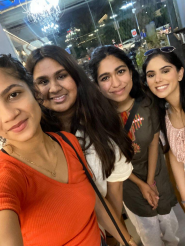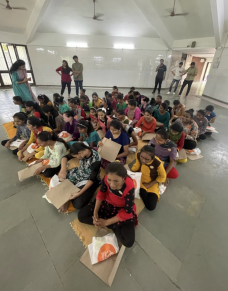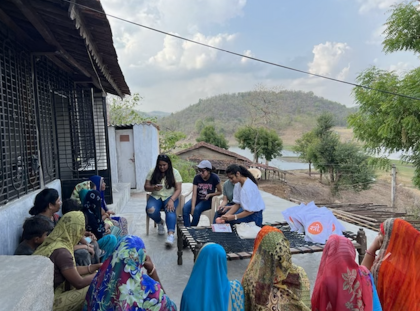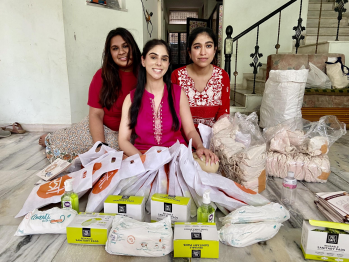Annie Gupta, jasmine Kumar, sanjana Thahura
Guiliano Fellows, Fall 2021

"A Silent Public Health Crisis: Breaking the cycle of period poverty in India" (Gujarat, India)
Unfortunately, many women around the world don't have access to menstrual hygiene products due to poverty, stigmatization, and lack of education. NGOs and different government funded organizations are doing their best to help women in developing nations have access to these products. One such NGO: Project Stree sets up educational workshops and provides period products for women in India. With the help of the grant awarded to us by the Edward Guiliano Global Fellowship we were able to work with Project Stree and help women in Gujarat, India.
Period poverty refers to the inadequate access to menstrual health and hygiene products due to economic hardships. In India, it is estimated that 71% of girls do not have knowledge. Around 88% of women and girls lack adequate menstrual hygiene products and resort to old rags and cloth as an alternative (Geertz et. al, 2016). Furthermore, women or girls who aren't in school never receive menstrual health education given by NGOs and other organizations that take place solely in schools. Cultural taboos surrounding menstruation and period products being too luxurious cause many women miss out on menstrual health and female health education. However, more NGOs and government funded workshops on menstrual health are being provided to women in both rural and urban areas in India. These workshops have improved women's understanding of periods along with increasing their willingness to seek out further medical assistance for menstrual and other feminine health issues (Omidvar et. al,2018 ).
Project Stree is an NGO based in the USA that provides menstrual health education and products to various locations in Gujarat, India. Their workshops take place in both urban and rural areas as well as in schools. Each workshop provides comprehensive education in menstrual hygiene, overcoming social stigmas, as well as building a community which empowers young women and girls ( Impact, 2022). Using donations from the help of undergraduate student ambassadors nationwide, the NGO was able to raise over $8,500, donate over 7,000 menstrual hygiene products and educate over 2,000 women in 16 different communities as of 2022 (Impact, 2022) . This past June, we were able to assist Project Stree in five workshops which took place in two blind schools and in an urban sector and rural village. We were able to provide menstrual hygiene products, education and witness first hand how these services change the attitude of young women and girls regarding menstruation.

Training and Preparation
End The Stigma, an organization we founded at Stony Brook University, focuses on destigmatizing periods and educating women on healthy period habits. It worked many times with Project Stree, an NGO with a similar mission that educates and provides women with sanitary products directly in India. With the Guliano fellowship, we got the opportunity to join their on ground workshops in India.
Our training to attend and teach at the workshops in India began in December 2021 with Juhi Patel and Ria Soni, the cofounders of Project Stree. We learnt more about the mission of the organization. We created a syllabus and script for us to present to the women in Gujarati. It was really important to us that the young women and girls felt comfortable with us and could trust us. They should feel as if we were one of them and be able to ask questions freely. Gujarati being a new language for all of us came with a lot of practice. With Juhi and Ria’s help, we were ready to present in Ahmedabad.
In Ahmedabad, we met Dr. Shivani Soni, the workshop coordinator for Project Stree. She started running workshops at the start of the coronavirus pandemic. She is joined by many close friends who even with their full-time jobs, volunteer every weekend holding workshops in schools across Ahmedabad. Shivani helped us become more comfortable with Ahmedabad, she helped us prepare for the workshops, and welcomed us into her family home in Idar. We are very grateful to have her support during our trip.
Packing
Prior to the workshops we would meet at Shivani’s local hostel in Ahmedabad to pack gift bags given on behalf of Project Stree. These bags were filled with environmentally friendly reusable sanitary pads, We Wear Equal underwear, a Project Stree logo pin, and either braille books for the students at the school for the blind or brochures with details from the presentation given at workshops. The brochure also had a reusable calendar where the women could use to track their monthly period. It was emphasized to the women that tracking their period is very important as any consistent irregularity may or may not be a possible indication of a health issue that they could discuss with their gynocologist.
Workshops
We were able to volunteer at five workshops with Shivani’s support. The initial workshop took place at Pragna Kulam, an all girls ashram for the blind. At this workshop we were able to meet a wonderful group of students from a variety of age ranges. Pragna Kulam opened a school for female students in January as an effort to support them and showcase their talents. The students at Pragna Kulam were taught many things including how to sing and dance. This talented group of students so kindly performed Bollywood songs for us at the end of the workshop.
The workshop itself entailed a presentation in both Hindi and Gujarati by us and a Project Stree volunteer named Mitwa. Within the presentation we were able to explain the importance of menstrual hygiene management, at-home remedies for cramps, and biological information about menstruation and the bodily changes that are experienced alongside it. In order to better picture
the uterus and the flow of blood in menstruation, we went from student to student with the uterus model and had them trace and feel the model so they could picture it in their minds as we traced their fingers along the pathway of blood flow. Additionally, this was Project Stree’s very first workshop where they were able to print their presentation onto braille books for the students. Lastly on behalf of Project Stree, each student received a bag with an environmentally friendly reusable pad, We Wear Equal underwear, and a Project Stree pin.
The second workshop we volunteered at was in Krishna Nagar Vejalpur sector one. We joined members of the area who were in line waiting to get their water. We spoke to the women and men online as we delivered our presentation with the help of Mitwa. Afterwards, we were able to give the women on the line bags of environmentally friendly reusable pad, We Wear Equal underwear, a Project Stree pin, and a brochure detailing all of the information from the presentation along with a reusable calendar to track their monthly period on behalf of Project Stree. Everyone in line was very welcoming and it was really important for us to make them feel comfortable.
The third workshop took place at Andh Kanya Shala, a school for blind female students. Similar to Pragna Kulam’s workshop, within the presentation we had each student trace the uterus model to better picture it and read the braille books. After the workshop each student was given Project Stree’s bag, a pin, an environmentally friendly reusable pad, and We Wear Equal underwear. The students were so kind and it was an honor to meet each of them.
The fourth workshop was at Krishna Nagar Vejalpur sector two. Alongside the other volunteers, we went with Shivani from door to door to request and gather all the women in the area together for the presentation and give them menstrual hygiene products.It was so nice to visit the area once again and connect with a new group of women.
The final workshop was in Vanaj, near Polo Forest, in Idar, Gujarat. Idar is a beautiful town that is about a two hour drive away from Ahmedabad. Shivani showed us around some areas in her hometown of Idar after welcoming us into her home for a delicious lunch. From there we volunteered at our final workshop. Vanaj is a rural village area where resources were more limited, so it was a very impactful experience presenting to women of all different age ranges the importance of menstrual hygiene, visiting doctors if they experience period abnormalities or other issues, and much more. After giving them the menstrual health hygiene bags and a presentation, we were able to interview some of the women in this area as well for their feedback. We were happy to hear that the women felt heard and more comfortable discussing their period after the presentation.

Workshop given to women in Vanaj, near Polo Forest
Ahmedabad City Experiences and Sites
For most of the duration of our 13 day trip in India we stayed in the Gujrati city of Ahmedabad. Our hotel was in Usmanpura and we conducted most of our travels out of the hotel into local towns and villages using autos; miniature taxi cabs. We wanted to have an authentic Gujarati experience so we opted to visit local markets and handicrafts stores rather than ordinary shopping malls. Most of our shopping was in Bhadra or the old city of Ahmedabad located on
the other side of the Sabarmati river. In the local towns and markets of Bhadra we were able to purchase traditional ethnic wear as well as have clothes made to size by local tailors. Besides shopping we also did a lot of sightseeing. In the village of Adalaj we visited the Rudabai Stepwell. This five story stepwell carved of stone descends into a clear collection of rainwater. This stepwell was created by a local queen in the late 1400s for her deceased husband. The stepwell is decagonal in shape with intricate Indian motifs carved onto its stone walls. Outside the city of Ahmedabad we also went to local towns in the Sabarkantha district of Gujarat. One such town was Idar in which we climbed the stony hills it is known from. From the top of the Idar Hills we were able to view local Jain temples, Sufi dargahs, and stepwells. The Polo Forest or the Vijaynagar forest had century old temples as well as exotic animals such as panthers and leopards roaming its deciduous forest. The forest also rests on the banks of theHarnav river which we were able to view and skim stones in.
The rest of our trip consisted of educating young girls and women about menstruation inthe Project Stree workshops. These workshops took place in various schools and other urban andrural locations. Talking with these women allowed us to get a glimpse of the life of an averagewoman living in Gujrat.We had a great time visiting Gurjat and learning about their language andculture. We hope to come back again and stay longing to explore and learn new things.
Education
The presentations consisted of a description of what periods are, an overview of the biology of the menstrual cycle, common symptoms and generalized experiences faced throughout menstruation, the importance of menstrual hygiene management, and the importance of destigmatizing menstrual taboos.
More specifically, our script for the presentation discussed that the reason why one gets their period is because the egg cell that has been released by the ovaries into the fallopian tube does not get fertilized by a sperm cell. Additionally, the pamphlet that is gifted by Project Stree and the uterus model discussion within the presentation explains how at first the uterus lining is shed, next the uterus lining starts to grow again, then the mature egg is released from the ovary, and when it does not get fertilized the uterus lining continues to thicken again. Each step was explained in Gujarati on the brochure and in Hindi or Gujarati during the presentation part with the uterus model.
Our script in the presentation also discussed how some common symptoms during menstruation can include stomach cramps, headaches, back aches, hormonal changes, acne, food cravings, mood swings, and more. We emphasized how these experiences and symptoms are very generalized so they do not reflect every person who menstruates experience and or symptoms throughout their period. We really wanted the students to learn that these symptoms vary for everyone and that is exactly why it is so important to openly talk about menstruation without any stigma associated with it, so that if someone were to experience symptoms that were severely impacting their health they could discuss it with others who menstruate and hopefully be encouraged to seek support from a physician.
When discussing healthy hygiene habits we mentioned how it is important to utilize clean sanitary pads, menstrual cups, or tampons, and wear clean new underwear daily. Some tips we discussed were to change the underwear if it gets blood on it, to change the menstrual hygiene products every two to four hours especially for those who have a heavy flow, to gently rinse your vagina with soap and water without using any special washes with perfumes as the vagina also cleans itself, and to regularly shower and rest during your period. We emphasized how hygiene habits prevent bacterial infections from possibly occurring.
Lastly, within our script we mentioned how unfortunately women all over the world are made to feel dirty, impure, and unworthy from attending schools, talking to men, or attending religious institutions when they are menstruating. We then emphasized that periods are a normal part of female health and should not be a taboo subject. Additionally, we discussed how we can reduce period stigma in our community by talking about periods openly or not in secret with family members, members in their community, and their male counterparts or anyone who does not menstruate. We ended our presentation with this line “Half the world menstruates. Without women no one can give birth or no one can be born so why be ashamed of that.”.

Dinner
We had the opportunity to meet with the students at Pragna Kulam school once again for dinner at Prime Dine restaurant in Ahmedabad on behalf of us three. At the dinner we got to learn more about the students, talk to them about their interests, and we also had long discussions on the best places to visit in Ahmedabad for tourists. A student named Ayesha spoke about how
much she learned from the workshop presentation and how happy she was to meet us. We told Ayesha and all of the other girls that it was such a great experience meeting them as well and we had so much fun. At the end of the dinner we gifted the girls goody bags of little jewelry, such as payal, which are anklets that are very popular in South Asian culture.
Survey
The women and girls who attended the workshops all stated they learnt new hygiene tips from the discussions we had. To quantify the impact of Project Stree workshops. We asked some yes or no post-workshop questions in Gujarati.
Questions:
Translated In English
- Do you feel like you have more knowledge about how and why menstruation happens following the workshop?
- Do you think following the workshop, you can now explain to people, family, friends around you about menstruation, why and how it happens, and healthy hygiene habits? 3. Post the workshop, did you learn more hygiene habits and how to properly use clean and dry sanitary napkins?
- Did the workshop help you feel less shame about menstruation? Will you be more comfortable talking about it in the future without feeling embarrassed and understand why normalizing it is important?
Survey questions were asked at the school for blind girls in Ahmedabad Gujarat. Most participants responded yes to the survey questions there. Survey questions were also asked in rural Idar, Gujarat. Answers were a unanimous yes to every question in rural Idar.
Impact
Project Stree workshops run every weekend by a group of 20+ volunteers in Ahmedabad and surrounding rural areas. The funds for this organization are all donation based. Since its start, Project Stree has donated almost 8000 reusable pads and its educational program about menstrual hygiene has reached over 2200 women and girls. Project Stree has not only educated young women but is able to directly dispel societal stigmas by talking to multiple generations at once. Menstrual taboo is passed on through generations in India. By breaking this cycle, young girls can learn to not be ashamed of their bodies, take control of their health, and be able to comfortably attend school during menstruation. We are so fortunate to be a part of the braille booklet launch and be educators in the workshops we were able to attend. This is only the beginning for Project Stree. Thousands of girls will continue to benefit from the workshops and the menstrual hygiene products provided. We also hope that Project Stree and Stony Brook University’s End The Stigma’s connection remains strong and future Stony Brook University are able to contribute and take part in this cause again. We are extremely grateful for this fellowship experience that has been given to us and make it possible for us to participate in the workshops.
The Guiliano Global Fellowship Program offers students the opportunity to carry out research, creative expression and cultural activities for personal development through traveling outside of their comfort zone.
GRADUATE STUDENT APPLICATION INFORMATION
UNDERGRADUATE STUDENT APPLICATION INFORMATION
Application Deadlines:
Fall deadline: October 1 (Projects will take place during the Winter Session or spring semester)
Spring deadline: March 1 (Projects will take place during the Summer Session or fall semester)
Please submit any questions here.
